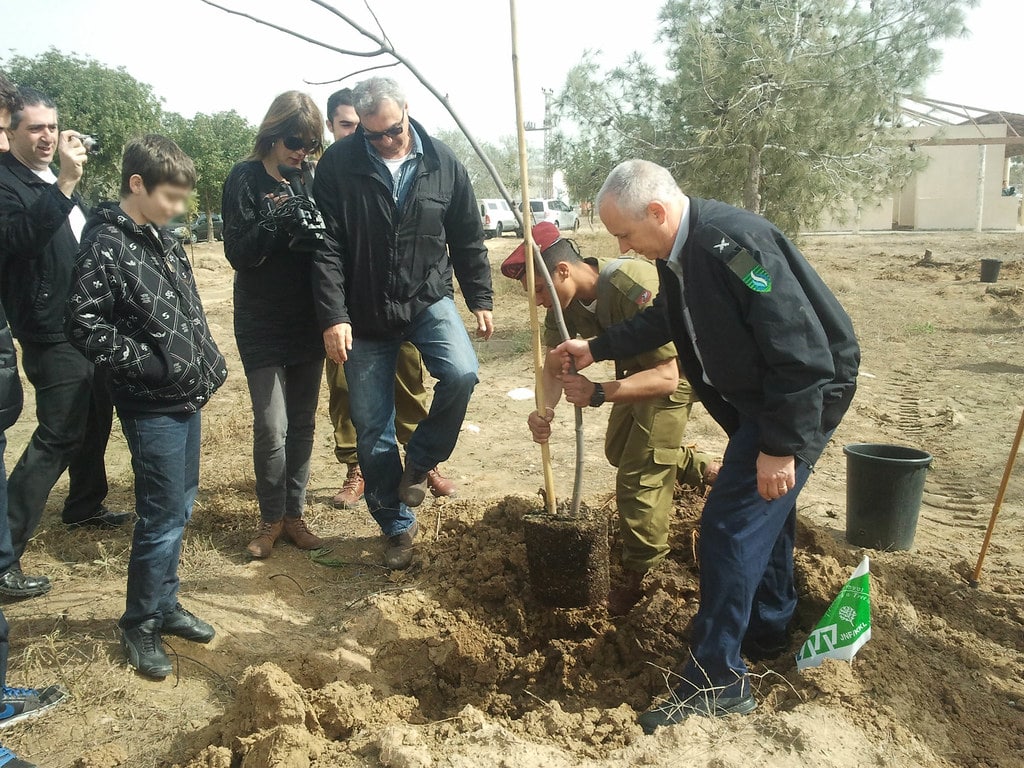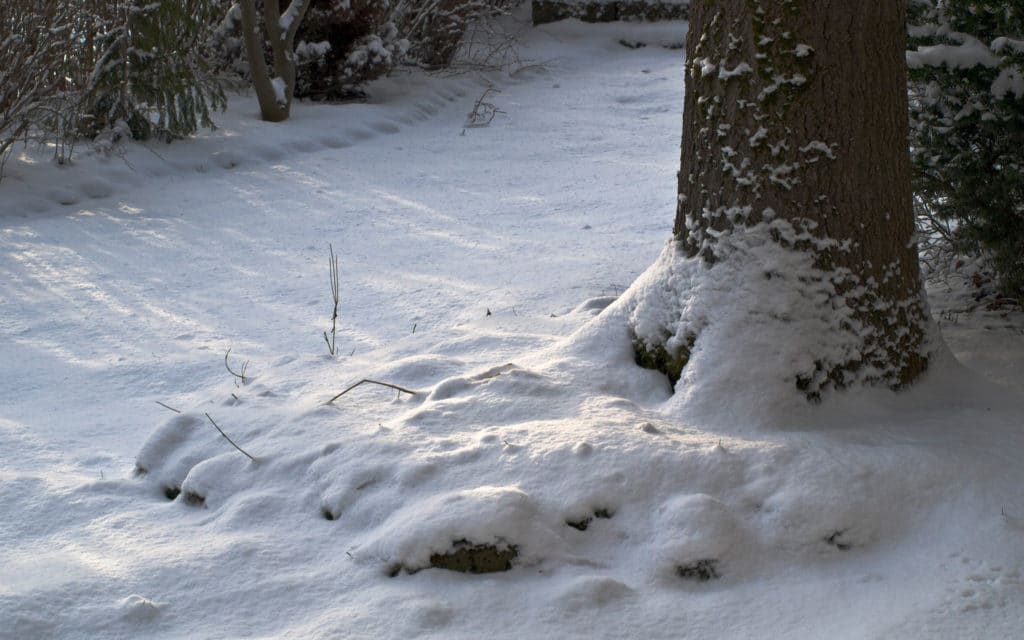
Tu Bishvat literally means the 15th day of the Hebrew month of Shevat (“Tu” expresses the number 15 in Hebrew), and is the Jewish “New Year for the trees,” or “Rosh HaShanah La’ilanot” in Hebrew. It is also known as the Jewish “birthday of the trees.”
Read more: Get our guides to all the Jewish holidays.
When is Tu Bishvat 2024?
Tu Bishvat starts the evening of Wednesday, Jan. 24, 2024, and ends the evening of Thursday, Jan. 25, 2024.
What is Tu Bishvat and how is it celebrated?

Tu Bishvat is a holiday many of us don’t know so much about, but when you dig into it, it has so much depth. A few of the ways it is typically celebrated are:
- Physically planting trees in Israel
- Making contributions to the Jewish National Fund, which uses the donations to plant trees in Israel
- Eating fruits and grains that remind us of the Land of Israel, especially what are known as the “seven species”: wheat, barley, grapes, figs, pomegranates, olives and dates (read more about this below)
- Praying for a “beautiful etrog” on the coming holiday of Sukkot
- Hosting a Tu Bishvat seder, which is largely modeled after the Passover seder.
According to Rabbi Meir Soloveichik, after the destruction of the Second Temple and expulsion of the Jews from the land, “marking Tu Bishvat became a way of connecting to Eretz Israel, to the homeland of the Jewish people. It was a form of celebrating the land’s sanctity and of remembering the botanical specimens that figure in the Bible.”
Tu Bishvat has taken on multiple meanings through the centuries under the influence of Kabbalah (Jewish mysticism) in the 16th century, modern Zionism in the 20th century and the present-day environmental sensibility. The themes of this holiday include nature, agriculture, connecting to the Land of Israel and our ancient roots, caring for the environment, sustainability, planting seeds, growing, patience and investing in the future.
When is Tu Bishvat?
Tu Bishvat falls on the 15th day of the Hebrew month of Shevat. This year, that corresponds to the evening of Sunday, January 16 until the evening of Monday, January 17. Tu Bishvat comes “early” this year in the Gregorian calendar — it typically happens between mid-January and mid-February.
How to greet someone on Tu Bishvat
To greet someone on the holiday, you can say, “chag sameach” (“happy holiday!”) or simply wish them a “happy Tu Bishvat.”
Is Tu Bishvat in the Bible?

Tu Bishvat is not mentioned in the Bible. It is first mentioned in the Mishnah (Rosh Hashanah 1:1) as one of four different “new years”:
- The 1st of Nissan — the “new year for kings and festivals”
- The 1st of Elul — the “new year for the tithing of cattle”
- The 1st of Tishrei — the “new year for counting years” (i.e., Rosh Hashanah)
- The 15th of Shevat — the “new year for the trees” (i.e., Tu Bishvat).
Beit Hillel and Beit Shammai disagreed about the date for the new year of the trees, but, as usual, we follow the opinion of Beit Hillel who ruled it was on the 15th of Shevat.
Tu Bishvat began as a technical date for the purpose of knowing when fruit could be eaten according to Biblical laws. Let’s explain.
The Torah (Vayikra/Leviticus 19: 23 – 25) states that one may not eat fruit from trees in the Land of Israel until the fifth year after they are planted. The first three years, the fruit is forbidden, and in the fourth year, the fruit was to be offered to the priests in the Temple.
These laws raised the question of how to determine the age of all of the trees and fruit. The rabbis designated Tu Bishvat as the “birthday” of all the trees in order to calculate how old the trees were and when the fruit could be eaten.
Each year on this day, the trees are considered to have aged one more year, and all of the fruit trees that are considered five years or older can be eaten from.
In addition to the Mishnah, Tu Bishvat is also referenced in the Talmud (Bava Metzia 106b) as the beginning of the season of “cold” (kor) — coming after the season of “winter” (choref), and before the season of “reaping/harvesting” (“katzir”). In Israel, Tu Bishvat marks the beginning of the season when almond trees — the earliest-blooming trees — start to bloom, hinting at the first signs of spring.
Why do we celebrate Tu Bishvat?
Although Tu Bishvat began as a technical date for observing Biblical laws, it took on many new meanings and interpretations throughout the centuries. Here are a few reasons why we celebrate it — see which ones you like best!
1. It celebrates the Jewish people’s ancient connection with the Land of Israel.

According to Rabbi Meir Soloveichik, Tu Bishvat is “a holiday of longing for the Holy Land.” Since the agricultural laws in the Bible only apply to fruits grown in the Holy Land, he said, Tu Bishvat is “a celebration of the fruits of the Holy Land” and “a way for Jews who live thousands of miles away from the Land of Israel to reconnect with the land of their ancestors.”
After the Jews were expelled from the Land of Israel, Rabbi Soloveichik explained, Jews developed a custom on Tu Bishvat of eating fruits that reminded them of the land. “As Jews, we flourish first and foremost when we recognize our roots and the land that has spiritually sustained us throughout our existence,” he added.
In the 16th century, the Kabbalists (Jewish mystics) initiated the tradition of a Tu Bishvat seder, which reflected their “yearning for redemption in a living land,” Rabbi Eli Kavon wrote.
Tu Bishvat was transformed with the establishment of the state of Israel. In 1949, less than a year after the creation of the state, Prime Minister David Ben-Gurion planted the first trees in honor of the festival.
2. Tu Bishvat expresses the Jewish concern for the environment.
Is caring for the environment a Jewish value? Yes, absolutely. A famous Midrash (Kohelet Rabbah 7:13) underscores this:
“When God created the first human, He took him and showed him all the trees of the Garden of Eden and said to him, ‘Look at My works, how beautiful and praiseworthy they are! And everything that I created, I created it for you. Pay attention that you do not spoil and destroy my world — if you do, there will be no one after you to repair it.’”
The Torah underscores our responsibility for nature as well. Bereshit/Genesis (2:15) tells us that God placed human beings in the Garden of Eden “l’ovdah u’lishomra,” “to work it and to guard it.” Commenting on this, Rabbi Jonathan Sacks wrote:
“This is perhaps the best short definition of humanity’s responsibility for nature as the Bible conceives it. We do not own nature…We are its stewards on behalf of God, who created and owns everything. As guardians of the earth, we are duty-bound to respect its integrity.”
3. It is about “planting seeds” and investing in the future, for ourselves or for those who come after us.

At first glance, it is counterintuitive that we would celebrate Tu Bishvat in the middle of winter. Wouldn’t it make more sense to celebrate the birthday of the trees in the spring, when the flowers are blooming and fruit is ripening?
The Israeli journalist Sivan Rahav-Meir offered the following explanation for why we celebrate Tu Bishvat in the winter: This holiday is not about reaping the fruits of our efforts; instead, it is a time to “invest in the future” through planting, waiting and believing.
“We see that natural processes are slow and hidden, that development happens beneath the surface,” Rahav-Meir wrote. “We do not see immediate results, but still need to care for what we plant and to strengthen our resolve to be patient.”
“In an era when we wait impatiently for two blue checks next to our Whatsapp message, we are reminded once a year of the things we need most: patience, persistent effort, devotion,” she added. “All of these, in the end, bring the longed for results and wonderful fruits.”
The message of planting seeds and investing in the future — even if we ourselves are not able to reap the “fruits” of our efforts — is underscored in a famous story in the Talmud (Taanit 23a) about Choni HaMe’agel:
אָמַר רַבִּי יוֹחָנָן: כׇּל יָמָיו שֶׁל אוֹתוֹ צַדִּיק, הָיָה מִצְטַעֵר עַל מִקְרָא זֶה: ״שִׁיר הַמַּעֲלוֹת בְּשׁוּב ה׳ אֶת שִׁיבַת צִיּוֹן הָיִינוּ כְּחֹלְמִים״, אָמַר: מִי אִיכָּא דְּנָיֵים שִׁבְעִין שְׁנִין בְּחֶלְמָא? יוֹמָא חַד הֲוָה אָזֵל בְּאוֹרְחָא, חַזְיֵיהּ לְהָהוּא גַּבְרָא דַּהֲוָה נָטַע חָרוּבָא, אֲמַר לֵיהּ: הַאי, עַד כַּמָּה שְׁנִין טָעֵין? אֲמַר לֵיהּ: עַד שִׁבְעִין שְׁנִין. אֲמַר לֵיהּ: פְּשִׁיטָא לָךְ דְּחָיֵית שִׁבְעִין שְׁנִין? אֲמַר לֵיהּ הַאי גַּבְרָא: עָלְמָא בְּחָרוּבָא אַשְׁכַּחְתֵּיהּ. כִּי הֵיכִי דִּשְׁתַלוּ לִי אֲבָהָתִי — שְׁתַלִי נָמֵי לִבְרָאִי. יָתֵיב, קָא כָּרֵיךְ רִיפְתָּא, אֲתַאי לֵיהּ שִׁינְתָּא, נִים…וְנִים שִׁבְעִין שְׁנִין. כִּי קָם, חַזְיֵיהּ לְהָהוּא גַּבְרָא דְּהוּא קָא מְלַקֵּט מִינַּיְיהוּ, אָמַר לֵיהּ: אַתְּ הוּא דִּשְׁתַלְתֵּיהּ? אֲמַר לֵיהּ: בַּר בְּרֵיהּ אֲנָא.
The Gemara relates a story about Choni HaMe’agel. Rabbi Yoḥanan said: All the days of the life of that righteous man, Ḥoni, he was distressed over the meaning of this verse: “A song of Ascents: When the Lord brought back those who returned to Zion, we were like those who dream” (Psalms 126:1). He said to himself: Is there really a person who can sleep and dream for seventy years? How is it possible to compare the seventy-year exile in Babylonia to a dream?
One day, he was walking along the road when he saw a certain man planting a carob tree. Ḥoni said to him: This tree, after how many years will it bear fruit? The man said to him: It will not produce fruit until seventy years have passed. Ḥoni said to him: Is it obvious to you that you will live seventy years, that you expect to benefit from this tree? He said to him: That man himself found a world full of carob trees. Just as my ancestors planted for me, I too am planting for my descendants.
Ḥoni sat and ate bread. Sleep overcame him and he dozed off… He continued sleeping for seventy years. When he awoke, he saw a certain man gathering carobs from that tree. Ḥoni said to him: Are you the one who planted this tree? The man said to him: I am his son’s son.
On Tu Bishvat, we are encouraged to be just like the man who planted a carob tree. Though he did not live to enjoy the fruit himself, he planted the seeds for those who came after him.
4. Tu Bishvat reminds us of our inner strength/fortitude.

Rabbi Samson Raphael Hirsch offered another explanation of why Tu Bishvat occurs in the depths of winter — it reminds us of our own inner strength:
“The fifteenth of Shvat is the new year of the trees, the birthday of blossoms even in the middle of winter…Under this torn, dark, cold bark, new, fresh life pulsates…Behold the trees on the day of their birthday…they celebrate today their silent inner rebirth in defiance of nature’s onslaughts…But their inner core remained alive and fresh. They will always weather the storm…their foundation was in a place where weather and storms do not reach.”
5. It is an opportunity to perfect ourselves and the world (tikkun olam).
The kabbalists in the 16th century “regarded eating a variety of fruits on Tu Bishvat as a way of improving our spiritual selves,” Rabbi Michael Strassfeld, author of “The Jewish Holidays,” wrote. For them, this fruit symbolized the “Tree of Life” in the Garden of Eden and “the flow of divine energy that carries goodness and blessing into the world.”
The kabbalists created a Tu Bishvat seder in which fruits from the Land of Israel were given symbolic meaning. The goal of the seder was “to encourage this flow and to effect tikkun olam,” or spiritual perfection of human beings and the world, Strassfeld wrote.
Is Tu Bishvat a Jewish version of Earth Day?

Because of its focus on nature and trees, Tu Bishvat is often viewed as “Jewish Earth Day.” While it is true that Earth Day and Tu Bishvat both underscore the need to care for the environment, Tu Bishvat is not merely the Jewish equivalent of Earth Day.
Unlike Earth Day, Tu Bishvat is rooted in Jewish and mystical tradition, including the Jewish people’s ancient connection with the land of Israel, and the imperative to “guard” the earth in Bereshit/Genesis (2:15). Additionally, Tu Bishvat offers deeper messages about making investments for the long-term, being patient, and understanding that sometimes the process of bearing “fruit” can be slow.
Eating fruit on Tu Bishvat

On Tu Bishvat, it is customary to eat fruits from Israel, especially the fruit and grains that are mentioned in Devarim/Deuteronomy 8:8. These are known as the “seven species” (shivat haminim), and include:
- Wheat
- Barley
- Grapes
- Figs
- Pomegranates
- Olives
- Dates
Other foods that are commonly served on Tu Bishvat are any dried fruit, apples, pears, almonds, walnuts and carob fruit.
Recite the following blessing on most fruit:
בָּרוּךְ אַתָּה יְיָ אֱלֹהֵֽינוּ מֶֽלֶךְ הָעוֹלָם בּוֹרֵא פְּרִי הָעֵץ.
Baruch atah adonai eloheinu melech ha’olam borei p’ri ha-etz.
Blessed are you, Lord our God, Ruler of the Universe, who creates the fruit of the tree.
For bananas, strawberries, raspberries, melons and pineapple (which are not from a tree), use the following blessing:
בָּרוּךְ אַתָּה יְיָ אֱלֹהֵֽינוּ מֶלֶךְ הָעוֹלָם בּוֹרֵא פְּרִי הָאֲדָמָה.
Baruch atah adonai eloheinu melech ha’olam borei p’ri ha-adamah.
Blessed are you, Lord our God, Ruler of the universe, who creates the fruit of the earth.
“The Almond Tree is Blooming”
Below are lyrics to the holiday song, “Hashkediyah Porachat” (“The Almond Tree is Blooming”), also known as “Tu Bishvat Higia” (“Tu Bishvat is Here”):
השקדיה פורחת
ושמש פז זורחת
צפורים מראש כל גג
מבשרות את בוא החג
ט”ו בשבט הגיע
חג לאילנות
ט”ו בשבט הגיע
חג לאילנות
הארץ משוועת
הגיעה עת לטעת
כל אחד יקח לו עץ
באתים נצא חוצץ
The almond tree is blooming
And the golden sun is shining,
Birds atop each roof
Bless the arrival of the festival.
Tu Bishvat is here,
It’s the festival of trees.
Tu Bishvat is here,
It’s the festival of trees.
The land is crying out
The time of planting is here.
Each person shall take a tree
We’ll stride out with spades.
Tu Bishvat is here.
Originally Published Feb 5, 2023 11:00PM EST


